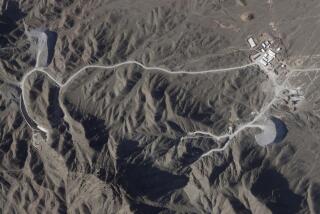Readers React: Nuclear deal: Why Iran is no North Korea
To the editor: Max Boot reminds us of North Korea’s failure to comply with its nuclear agreement with the United States. He then says Iran will probably be similarly evasive. (“Why is the Iran deal bad? Think North Korea,” op-ed, July 21)
The comparison is a specious one.
Boot claims the terms of the deal aren’t stringent enough to restrain Iranian nuclear ambitions, citing the delayed inspections as an opportunity for Iran to sanitize contested sites. In fact, technical experts point out that traces of radiation linger well past three weeks, making it extremely difficult to conceal nuclear activity at a targeted site.
Curiously, he also criticizes the deal for not addressing issues that are irrelevant to the agreement.
Boot fails to recognize the profound political and cultural differences between North Korea, a rogue state, and Iran. That North Korea refused to adhere to the terms of its agreement should not serve as a predictive model for Iranian behavior.
Andrew Spathis, Los Angeles
..
To the editor: Boot is right on target with his assessment of the Iranian leadership. In comparing North Korea and Libya, Boot provides an answer as to why Iran won’t give up its nuclear ambitions.
Immediately after the world accepted Moammar Kadafi’s apology and retribution in 2003 for supporting terrorism, and after he dismantled his country’s weapons of mass destruction programs, we supported a rebellion to overthrow him that resulted in his death.
In contrast, North Korea has not given up its weapons, and the regime there is still in power.
The failed Western intervention in Libya has given Iran a big reason never to give up its nuclear program. Our failure to secure Kadafi’s armories has provided Islamic State, Boko Haram and other terrorist groups with an ample supply of weapons, further encouraging Iran to build nukes.
Howard C. Mandel, Los Angeles
..
To the editor: Boot refers to the nuclear agreement between Iran and six global powers as “President Obama’s nuclear deal.” Once again, the political right is playing politics with foreign policy.
As a lifelong Republican, I am very disturbed that my party continues this practice of untimely interference with the setting of foreign policy by the elected administration (subject, of course, to Senate approval).
This interference with the nuclear deal, as well as the recent debacle that was Israeli Prime Minister Benjamin Netanyahu’s speech to Congress, are not examples of how our Founding Fathers envisioned the conduct of foreign affairs.
Mark Weissman, Rancho Palos Verdes
Follow the Opinion section on Twitter @latimesopinion and Facebook
More to Read
A cure for the common opinion
Get thought-provoking perspectives with our weekly newsletter.
You may occasionally receive promotional content from the Los Angeles Times.






